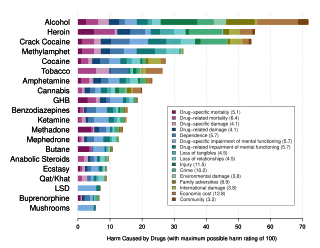Related Research Articles

Substance abuse, also known as drug abuse, is the use of a drug in amounts or by methods that are harmful to the individual or others. It is a form of substance-related disorder. Differing definitions of drug abuse are used in public health, medical, and criminal justice contexts. In some cases, criminal or anti-social behavior occurs when the person is under the influence of a drug, and long-term personality changes in individuals may also occur. In addition to possible physical, social, and psychological harm, the use of some drugs may also lead to criminal penalties, although these vary widely depending on the local jurisdiction.
The Substance Abuse and Mental Health Services Administration is a branch of the U.S. Department of Health and Human Services. SAMHSA is charged with improving the quality and availability of treatment and rehabilitative services in order to reduce illness, death, disability, and the cost to society resulting from substance abuse and mental illnesses. The Administrator of SAMHSA reports directly to the Secretary of the U.S. Department of Health and Human Services. SAMHSA's headquarters building is located outside of Rockville, Maryland.

Patrick Joseph Kennedy II is an American retired politician and mental health advocate. From 1995 to 2011, he served as a Democratic member of the United States House of Representatives from Rhode Island's 1st congressional district, and was the first Generation X member of congress when he took office in 1995. He is a former member of the Opioid and Drug Abuse Commission and a co-founder of One Mind, a mental health nonprofit.

Drug rehabilitation is the process of medical or psychotherapeutic treatment for dependency on psychoactive substances such as alcohol, prescription drugs, and street drugs such as cannabis, cocaine, heroin, and amphetamines. The general intent is to enable the patient to confront substance dependence, if present, and stop substance misuse to avoid the psychological, legal, financial, social, and medical consequences that can be caused.

James Marvin Ramstad was an American lawyer and politician who represented Minnesota's 3rd congressional district in the United States House of Representatives from 1991 to 2009. A member of the Republican Party, Ramstad served in the Minnesota Senate from 1981 to 1991.

The National Institute on Drug Abuse (NIDA) is a United States federal government research institute whose mission is to "advance science on the causes and consequences of drug use and addiction and to apply that knowledge to improve individual and public health."
Substance dependence, also known as drug dependence, is a biopsychological situation whereby an individual's functionality is dependent on the necessitated re-consumption of a psychoactive substance because of an adaptive state that has developed within the individual from psychoactive substance consumption that results in the experience of withdrawal and that necessitates the re-consumption of the drug. A drug addiction, a distinct concept from substance dependence, is defined as compulsive, out-of-control drug use, despite negative consequences. An addictive drug is a drug which is both rewarding and reinforcing. ΔFosB, a gene transcription factor, is now known to be a critical component and common factor in the development of virtually all forms of behavioral and drug addictions, but not dependence.
Treatment Improvement Protocols (TIPs) are a series of best-practice manuals for the treatment of substance use and other related disorders. The TIP series is published by the Substance Abuse and Mental Health Services Administration (SAMHSA), an operational division of the U.S. Department of Health and Human Services.
Drug addiction recovery groups are voluntary associations of people who share a common desire to overcome their drug addiction. Different groups use different methods, ranging from completely secular to explicitly spiritual. Some programs may advocate a reduction in the use of drugs rather than outright abstention. One survey of members found active involvement in any addiction recovery group correlates with higher chances of maintaining sobriety. Although there is not a difference in whether group or individual therapy is better for the patient, studies show that any therapy increases positive outcomes for patients with substance use disorders. The survey found group participation increased when the individual members' beliefs matched those of their primary support group. Analysis of the survey results found a significant positive correlation between the religiosity of members and their participation in twelve-step programs and to a lesser level in non-religious SMART Recovery groups, the correlation factor being three times smaller for SMART Recovery than for twelve-step addiction recovery groups. Religiosity was inversely related to participation in Secular Organizations for Sobriety.
SMART Recovery is an international community of peer support groups that help people recover from addictive and problematic behaviors, using a self-empowering and evidence-informed program. SMART stands for Self-Management and Recovery Training. The SMART approach is secular and research-based. SMART has a global reach with a presence established in more than 30 countries. SMART Recovery is effective with a range of addictive and problematic behaviors.
The California Department of Alcohol and Drug Programs (ADP) was a California state agency concerned with substance abuse prevention and treatment. Created by the California Legislature in 1978, ADP brought together the Governor's Office of Alcoholism and the California Department of Health's Division of Substance Abuse to form the single state authority for substance abuse prevention and treatment, and is currently within the auspices of the California Health and Human Services Agency. In this capacity, ADP provided leadership and policy coordination for the planning, development, implementation, and evaluation of a comprehensive statewide system of alcohol and other drug (AOD) prevention, treatment and recovery services. As of July 1, 2013, functions of ADP were transferred to the Department of Health Care Services.

Substance use disorder (SUD) is the persistent use of drugs despite the substantial harm and adverse consequences to one's own self and others, as a result of their use. In perspective, the effects of the wrong use of substances that are capable of causing harm to the user or others, have been extensively described in different studies using a variety of terms such as substance use problems, problematic drugs or alcohol use, and substance use disorder.The National Institute of Mental Health (NIMH) states that "Substance use disorder (SUD) is a treatable mental disorder that affects a person's brain and behavior, leading to their inability to control their use of substances like legal or illegal drugs, alcohol, or medications. Symptoms can be moderate to severe, with addiction being the most severe form of SUD".Substance use disorders (SUD) are considered to be a serious mental illness that fluctuates with the age that symptoms first start appearing in an individual, the time during which it exists and the type of substance that is used. It is not uncommon for those who have SUD to also have other mental health disorders. Substance use disorders are characterized by an array of mental/emotional, physical, and behavioral problems such as chronic guilt; an inability to reduce or stop consuming the substance(s) despite repeated attempts; operating vehicles while intoxicated; and physiological withdrawal symptoms. Drug classes that are commonly involved in SUD include: alcohol (alcoholism); cannabis; opioids; stimulants such as nicotine (including tobacco), cocaine and amphetamines; benzodiazepines; barbiturates; and other substances.

Addiction is a neuropsychological disorder characterized by a persistent and intense urge to use a drug or engage in a behavior that produces natural reward, despite substantial harm and other negative consequences. Repetitive drug use often alters brain function in ways that perpetuate craving, and weakens self-control. This phenomenon – drugs reshaping brain function – has led to an understanding of addiction as a brain disorder with a complex variety of psychosocial as well as neurobiological factors that are implicated in addiction's development.
Addiction psychiatry is a medical subspecialty within psychiatry that focuses on the evaluation, diagnosis, and treatment of people who have one or more disorders related to addiction. This may include disorders involving legal and illegal drugs, gambling, sex, food, and other impulse control disorders. Addiction psychiatrists are substance use disorder experts. Growing amounts of scientific knowledge, such as the health effects and treatments for substance use disorders, have led to advancements in the field of addiction psychiatry. These advancements in understanding the neurobiology of rewarding behavior, along with federal funding, has allowed for ample opportunity for research in the discipline of addiction psychiatry. Addiction psychiatry is an expanding field, and currently there is a high demand for substance use disorder experts in both the private and public sector.

Michael P. Botticelli is an American public health official who served as the director of the White House Office of National Drug Control Policy (ONDCP) from March 2014 until the end of President Obama's term. He was named acting director after the resignation of Gil Kerlikowske, and received confirmation from the United States Senate in February 2015. Prior to joining ONDCP, he worked in the Massachusetts Department of Public Health. Following completion of his service as ONDCP Director, he became the executive director of the Grayken Center for Addiction Medicine at the Boston Medical Center.
About 1 in 7 Americans suffer from active addiction to a particular substance. Addiction can cause physical, psychological, and emotional harm to those who are affected by it. The American Society of Addiction Medicine defines addiction as "a treatable, chronic medical disease involving complex interactions among brain circuits, genetics, the environment, and an individual's life experiences. People with addiction use substances or engage in behaviors that become compulsive and often continue despite harmful consequences." In the world of psychology and medicine, there are two models that are commonly used in understanding the psychology behind addiction itself. One model is referred to as the disease model of addiction. The disease model suggests that addiction is a diagnosable disease similar to cancer or diabetes. This model attributes addiction to a chemical imbalance in an individual's brain that could be caused by genetics or environmental factors. The second model is the choice model of addiction, which holds that addiction is a result of voluntary actions rather than some dysfunction of the brain. Through this model, addiction is viewed as a choice and is studied through components of the brain such as reward, stress, and memory. Substance addictions relate to drugs, alcohol, and smoking. Process addictions relate to non-substance-related behaviors such as gambling, spending money, sexual activity, gaming, spending time on the internet, and eating.
David R. Gastfriend is an American psychiatrist, internationally recognized addiction treatment researcher, the former Chief Executive Officer of the Treatment Research Institute (TRI), and current Chief Medical Officer of DynamiCare Health.
Discrimination against people with substance use disorders is a form of discrimination against people with this disease. In the United States, people with substance use disorders are often blamed for their disease, which is often seen as a moral failing, due to a lack of public understanding about substance use disorders being diseases of the brain with 40-60% heritability. People with substance use disorders are likely to be stigmatized, whether in society or healthcare.

Tim Ryan is an American activist, drug abuse interventionist, author and speaker. He is the Founder and Executive director of “A Man in Recovery” foundation. According to the National Safety Council, Ryan is notable for his position in favor of Drug policy reform and as a proponent of legislative change in American drug policy. His work was the subject of the A&E series “Dope Man” in July 2017. Ryan is also the author of the 2017 memoir From Dope to Hope: A Man in Recovery.
References
- ↑ "U.S. Representative Jim Ramstad Announces New Congressional Recovery Caucus In Betty Ford Center Address" . Retrieved 5 Jul 2013.
- ↑ "Congressional Addiction, Treatment and Recovery Caucus". Archived from the original on 15 July 2013. Retrieved 5 Jul 2013.